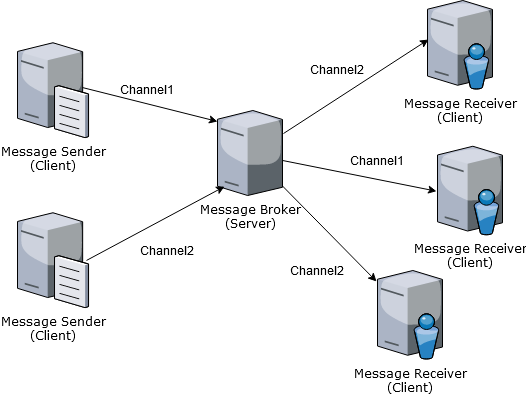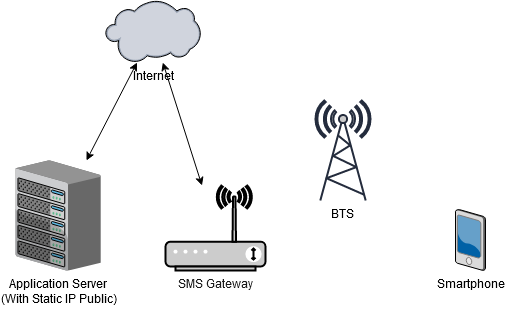Sometime, you need a very lightweight message broker that would run on a system with very minimum specifications. On the other hand, your server is ready with the PHP runtime. Installing a message brokerage service with large system requirements is not your choice because you are coming from very minimal resources.
Using a very light library is your choice because you don't want to sacrifice enormous resources for a very simple task. PHPMessageBroker is one of your choices. With a very easy installation and only using two server-side files, you can create a message broker that can forward messages from one client to another.
PHPMessageBroker is lightweight message broker that 100% PHP. You can use MariaDB or MySQL database to ensure that message received to the receiver. However, you can use another DBMS by modifying a little of the sorce code.
You can still use PHPMessageBroker without using a database. In this case, the message will only be received if the recipient has connected to the server before sender send the message. Once the message is received by the server, it will disappear immediately regardless of whether it arrives or not.
No external libraries required. On Windows operating system, make sure tha the extension=php_sockets.dll is uncommented.
From image above, we can see that message sender (client 1) can send message to receiver (client 2). Both sender and receiver do not require public IP address.
PHPMessageBroker support multi channel. Receivers only will receive message with same channel. The user can limit the number of receivers for each channel. This is very useful for avoiding duplicate sending if an application is running more than one receiving process.
PHPMessageBroker use HTPasswd as user credentials. To generate user password, use tool like https://www.htaccesstools.com/htpasswd-generator/
Supported Algorithm:
- SHA
- APR1
If you want to keep data to a database to ensure that message received to the receiver, database structure shown below:
CREATE TABLE IF NOT EXISTS `data` (
`data_id` bigint(20) NOT NULL AUTO_INCREMENT,
`channel` varchar(100) DEFAULT NULL,
`data` longtext,
`created` datetime DEFAULT NULL,
PRIMARY KEY (`data_id`),
KEY `channel` (`channel`)
) ENGINE=InnoDB DEFAULT CHARSET=latin1 AUTO_INCREMENT=1;You can define the fields in the table yourself according to your needs, but if you want to save the data in JSON format then the structure above is enough.
If you use the database to store the message, server will load message from the database and send it to the receiver after login successfully.
Example application is SMS gateway server. If you want to build an OTP server for your small application.
Case
- Your application is on shared hosting or small VPS hosting
- You don't have any static IP address
- You wan't use SMS gateway provider (for any reason)
- You have an SMS gateway server and you want to put it on your home or your office
- You want to integrate the application server and SMS gateway server
Your system topology can be as shown below
Other applications are IoT and smart home application using Raspberry Pi and others.
Server Without Database
<?php
function error_handler($errno, $errstr, $errfile, $errline)
{
}
$old_error_handler = set_error_handler("error_handler");
require_once dirname(__FILE__)."/lib/MQServer.php";
$port = 8887;
$server = new MQServer($port, $numberOfReceiver, dirname(__FILE__)."/.htpasswd", true);
$server->showLog = false;
$server->run();
?>Constructor Parameters
MQServer(int $port, int $numberOfReceiver, String $userList,
[boolean $userFromFile])$portis the server port$numberOfReceiveris the number of receiver. If the number of receiver more than$numberOfReceiver, only first$numberOfReceiverwill receive the message.$userListis pair of username and password separated by colon. For example:"admin:$apr1$v07ls1hi$OayaxtrCFIHIzuhpaSL9/0"If more than one user, separate by return (\r\n).$userFromFileindicate that$userListis file name instead of pair of username and password.
Server With Database
<?php
function error_handler($errno, $errstr, $errfile, $errline)
{
}
$old_error_handler = set_error_handler("error_handler");
require_once dirname(__FILE__)."/lib/MQServer.php";
class Server extends MQServer{
private $database = null;
private $dbHost = null;
private $dbPort = null;
private $dbName = null;
private $dbUser = null;
private $dbPass = null;
private $recordLimit = 5;
public function __construct($port = 8887, $numberOfReceiver = 1, $userList = null, $userFromFile = false,
$keepData = false, $dbHost = null, $dbPort = null, $dbName = null, $dbUser = null, $dbPass = null)
{
parent::__construct($port, $numberOfReceiver, $userList, $userFromFile);
if($keepData)
{
$this->keepData = $keepData;
$this->dbHost = $dbHost;
$this->dbPort = $dbPort;
$this->dbName = $dbName;
$this->dbUser = $dbUser;
$this->dbPass = $dbPass;
$this->initDatabase();
}
}
private function initDatabase()
{
// Init database here
try
{
$url = "mysql:host=".$this->dbHost.";port=".$this->dbPort.";dbname=".$this->dbName;
$this->database = new PDO($url, $this->dbUser, $this->dbPass);
$this->database->setAttribute(PDO::ATTR_ERRMODE, PDO::ERRMODE_EXCEPTION);
}
catch(PDOException $e)
{
$this->keepData = false;
$this->log("Can not connect to database. Host : " . DB_HOST);
}
}
/**
* Load channel data from database
* @return String eesage to be sent to the client or null if data not exists
*/
public function loadFromDatabase($channel)
{
try
{
$channel = addslashes($channel);
$sql = "select * from data where channel = '$channel' ";
$db_rs = $this->database->prepare($sql);
$db_rs->execute();
$rowCount = $db_rs->rowCount();
if($rowCount > 0)
{
$num = $rowCount - $this->recordLimit;
if($num < 0)
{
$num = 0;
}
$this->nextRecord = $num;
$sql = "select * from data where channel = '$channel' order by data_id asc limit 0, ".$this->recordLimit;
$db_rs = $this->database->prepare($sql);
$db_rs->execute();
$rows = $db_rs->fetchAll(PDO::FETCH_ASSOC);
$data = array();
$dataIDs = array();
foreach($rows as $row)
{
$data[] = json_decode($row['data']);
$dataIDs[] = $row['data_id'];
}
if(!empty($dataIDs))
{
$sql = "delete from data where data_id in(".implode(", ", $dataIDs).")";
$db_rs = $this->database->prepare($sql);
$db_rs->execute();
}
return json_encode(array("command"=>"message", "data"=>$data));
}
else
{
return null;
}
}
catch(PDOException $e)
{
$this->initDatabase();
return $this->loadFromDatabase($channel);
}
}
public function saveToDatabase($clientData)
{
try
{
$channel = addslashes($clientData->channel);
$data = addslashes(json_encode($clientData->data));
$sql = "insert into data(channel, data, created) values ('$channel', '$data', now())";
$db_rs = $this->database->prepare($sql);
$db_rs->execute();
}
catch(PDOException $e)
{
$this->initDatabase();
$this->saveToDatabase($clientData);
}
}
}
$serverPort = 8887;
$numberOfReceiver = 0;
$userList = dirname(__FILE__)."/.htpasswd";
$userFromFile = true;
$useDatabase = true;
$databaseHost = "localhost";
$databasePort = 3306;
$databaseName = "message_broker";
$databaseUser = "root";
$databasePassword = "alto1234";
$server = new Server($serverPort, $numberOfReceiver, $userList, $userFromFile,
$useDatabase, $databaseHost, $databasePort, $databaseName, $databaseUser, $databsePassword);
$server->showLog = false;
$server->run();
?>Constructor Parameters
MQServer(int $port, int $numberOfReceiver, String $userList,
[boolean $userFromFile, [boolean $keepData, String $dbHost,
int $dbPort, String $dbName, String $dbUser, String $dbPass]])$portis the server port$numberOfReceiveris the number of receiver. If the number of receiver more than$numberOfReceiver, only first$numberOfReceiverwill receive the message.$userListis pair of username and password separated by colon. For example:"admin:$apr1$v07ls1hi$OayaxtrCFIHIzuhpaSL9/0"If more than one user, separate by return (\r\n).$userFromFileindicate that$userListis file name instead of pair of username and password.$keepDataindicate that server will keep data until any receiver received the messages$dbHostis the database host name or IP address$dbPortis the database port number$dbNameis the database name$dbUseris the database user$dbPassis the database password
Sender
<?php
function error_handler($errno, $errstr, $errfile, $errline)
{
}
$old_error_handler = set_error_handler("error_handler");
require_once dirname(__FILE__)."/lib/MQSender.php";
$address = "127.0.0.1";
$port = 8887;
$username = 'manager';
$password = 'Albasiko2020^';
$sender = new MQSender($address, $port, $username, $password);
$data = array(
'id'=>uniqid(),
'time' => time(0),
'receiver'=>'+6281200000000',
'message'=>"Kode OTP Anda adalah ".mt_rand(100000, 999999)
."\r\n>>>Jangan memberitahukan kode ini kepada siapapun<<<"
);
$channel = 'sms';
$sender->showLog = false;
$sender->send($data, $channel);
?>Constructor Parameters
MQSender(String $address, int $port, String $username, String $password)$addressis the host name or IP address of the message broker server$portis the port number of the message broker server$usernameis the username of the sender$passwordis the password of the sender
Note: The username of the sender and recipient does not have to be the same.
Sending Message
$sender->send(Object $data, String $channel);$datais object or associated array. It will be encoded to JSONObject$channelis channel name. Receiver only will receive this message if receiver use same channel
Receiver
<?php
function error_handler($errno, $errstr, $errfile, $errline)
{
}
$old_error_handler = set_error_handler("error_handler");
require_once dirname(__FILE__)."/lib/MQReceiver.php";
class Receiver extends MQReceiver{
public function processMessage($message)
{
global $i;
global $j;
$object = json_decode($message);
$rows = $object->data;
$i++;
foreach($rows as $idx=>$data)
{
$j++;
echo "Time : ".date('j F Y H:i:s', $data->time)
."\r\nReceiver : ".$data->receiver
."\r\nMessage : ".$data->message."\r\n\r\n";
//echo "i = $i | j = $j\r\n";
}
}
}
$i = 0;
$j = 0;
$address = "127.0.0.1";
$port = 8887;
$username = 'manager';
$password = 'Albasiko2020^';
$channel = 'sms';
$receiver = new Receiver($address, $port, $username, $password, $channel);
$receiver->showLog = false;
$receiver->run();
?>You can also pass channel name when invoke run method.
For example:
<?php
function error_handler($errno, $errstr, $errfile, $errline)
{
}
$old_error_handler = set_error_handler("error_handler");
require_once dirname(__FILE__)."/lib/MQReceiver.php";
class Receiver extends MQReceiver{
public function processMessage($message)
{
global $i;
global $j;
$object = json_decode($message);
$rows = $object->data;
$i++;
foreach($rows as $idx=>$data)
{
$j++;
echo "Time : ".date('j F Y H:i:s', $data->time)
."\r\nReceiver : ".$data->receiver
."\r\nMessage : ".$data->message."\r\n\r\n";
//echo "i = $i | j = $j\r\n";
}
}
}
$i = 0;
$j = 0;
$address = "127.0.0.1";
$port = 8887;
$username = 'manager';
$password = 'Albasiko2020^';
$channel = 'sms';
$receiver = new Receiver($address, $port, $username, $password, $channel);
$receiver->showLog = false;
$receiver->run($channel);
?>Please note that this process is synchronous. Passwing parameter to run method just to make sure the channel name to be listened. You can not change the channel name while it running.
Constructor Parameters
Receiver($address, $port, $username, $password, $channel);$addressis the host name or IP address of the message broker server$portis the port number of the message broker server$usernameis the username of the sender$passwordis the password of the sender$channelis the channel name
Note: The username of the sender and recipient does not have to be the same.


